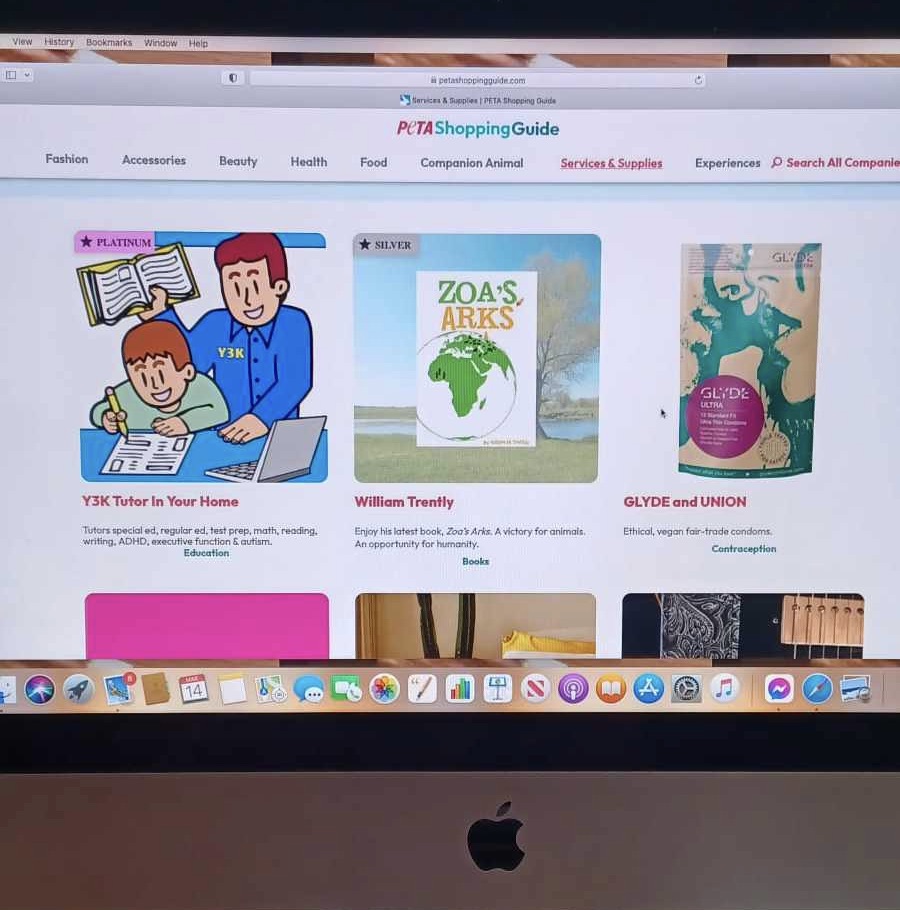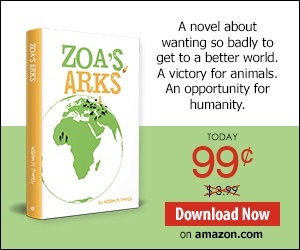April 26, 2025 Read from Zoa's Arks at the Rochester Authors Fair, Rochester Public Library, Rochester, New Hampshire.
May 3, 2024. This morning, I spent some time with the New Hampshire Animal Rights League (NHARL) at the Farm, Forest, & Garden Expo in Deerfield, NH. NHARL's topic was "dairy."
Cool! My book sits between tutoring services and vegan condoms! (March 14, 2024)

***

January 4, 2024: Although my book is concerned with the mistreatment of people deemed Other, the greater portion of the plot becomes tangled in the mistreatment of nonhuman animals. Because of this, I am now happy to announce I will be partnering with PETA.
  
   

In this excerpt, Bilal asks about the unusual name of an animal rights group, Charlie Don't Surf:
Monique explained, “It’s from the line in Apocalypse Now where the commander decides to have his troops surf in a dangerous location where the enemy can attack. Since Charlie—the nickname for the enemy—does not surf, he was saying that you won’t have to worry about encountering the enemy surfing out there on the water while you surf. Nothing to be afraid of. Screw Charlie, we’re going in. A brazen disregard for possible danger.” Karen added, “And sometimes you’ll hear one of us shout ‘Charlie don’t surf’ as we are about to go into a No Trespassing area. Dikembe is famous for yelling that out—sometimes too loud.”
“Yeah, we often find ourselves having to shush the big baby or else risk blowing our cover. He just has a hard time restraining himself.” Monique laughed as she chalked up a way to get even with the college boy.
“But that’s not the whole story,” Dustin said. “The line really means Charlie don’t surf but we do and we will because we have American exceptionalism and are better than them, superior to them. We surf. Charlie don’t. They are different from us, below us. Not cool like us. They are The Other, and that ain’t good. Therefore we are justified to annihilate them, to do whatever we want with them. We’ll dominate them, bomb them, and use their water to help ourselves to a little surfing.”
Dikembe continued, “The Clash put the line into a song and expanded it into ‘Charlie don’t surf and we think he should,’ bringing out all that American exceptionalism and imperialism. He should be like us. He’s not, though, so fuck him.”
Dustin said, “Most humans view animals as the Other. They are not like us. They can’t do what we can. Hell, they can’t use a surfboard like us. And they don’t cry. They don’t feel pain or experience emotions like we superior beings do because they’re not as advanced as we are. Charlie don’t cry, so let me oppress and exploit him.”
“And that certainly is not what we in animal rights believe. We know they have emotions and feel pain,” Karen said.
“Exactly,” said Dustin, “The ironic name was chosen carefully to accentuate that repugnant way of thinking. I don’t know, maybe we picked a name that’s too complicated and stupid. Sometimes I might wonder about that.” He laughed. “But then, I think it sets us apart from the other groups with predictable names. I think it’s good, all in all.”
October 27, 2023 Zoa's Arks is published.
New Novel About Wanting So Badly To Get to a Better World.
A Victory for Animals.
An Opportunity for Humanity.
Now available at amazon, barnes and noble, etc.
March 23, 2019: The World is Around You but You are in Your Car and Yes You Are Home will form the basis of a fast-paced 5-minute micro-TED talk-like presentation by the author tonight on finding simplicity in the complexity of life. Twenty images were selected to be projected overhead to accentuate the presentation. A different image advances every 15 seconds. Looking forward to what the other speakers have to say as well and it should be a lot of fun! Check out the website! And hopefully you can attend this interesting event, Ignite 2019: A Night of Simplicity, at Millspace: Center for Art, History and Culture in Newmarket, NH.
The William Fogg Library in Eliot, Maine held its first Author's Fair on Monday, October 28, 2013, featuring 20 local authors, including Jane Harper, Layne Case, Eileen Doyon, KD Mason, and W. Trently. The event was held in the library proper and the historic Fogg Homestead which is adjacent to the library.
New from the author! Snapshot: Ship's Dentists is a nonfiction book published in July 2011. The ADA New Dentist News (December 2011) featured Drs. William Trently, Jennifer Friedman, and Brian Tuttle in an article entitled "Transitioning From Federal Service Dentistry."
On Tuesday, May 3, 2011, the Wiggin Memorial Library in Stratham, New Hampshire hosted its Local Authors Night. Authors Lara Bricker, Pat Parnell, M.F. Bloxam, William Trently, and Norman Phillips read from their works and engaged in an interesting discussion of the writing process and business.
A short presentation by the author and book-signing was held January 13, 2010 at the Lamprey Professional Building in Raymond, New Hampshire for an audience of about 23 people. The book's framework was discussed, including the blending of fiction with nonfiction.
RiverRun Bookstore in Portsmouth, New Hampshire hosted a Local Authors Night on Monday, August 31, 2009 at 7 PM. There was wine and cheese and a chance to discuss books, writing, and publishing. The World is Around You was one of the books featured.
July 6, 2015: The following quote from Bill Nye succinctly captures much of the essence of Yes, You Are Home:
"Researchers have proven scientifically, that humans are all one people. The color of our ancestors' skin and ultimately my skin and your skin is a consequence of ultra-violet light, of latitude and climate. Despite our recent sad conflicts here in the U.S., there really is no such thing, scientifically, as race. We are one species. Each of us is much more alike than we are different. We all came from Africa. We're all made of the same star dust. We're all going to live and die on the same planet---a pale blue dot in the vastness of space. We have to work together!"
June 12, 2016:
"If we wish to avoid being numbered among the oppressors we must be prepared to rethink all our attitudes to other groups...If we can make this unaccustomed mental switch we may discover a pattern in our attitudes and practices that operates so as consistently to benefit the same group--usually the group to which we ourselves belong--at the expense of another group." ---Peter Singer
From the Portsmouth Herald, Thursday, August 13, 2009:
LOCAL MAN PUBLISHES FIRST BOOK
Wiliam M. Trently has penned his first published book. "The World is Around You, but You are in Your Car" is a work of fiction wrapped around an essay about what he sees as an American problem — the relentless pursuit of the perfect life and its negative consequences that adversely affect progress and behavior toward the rest of the world.
"I want it and I want it now," with its shortage of self-restraint, has been taken to levels not reached before, says Trently in a press release. The ramifications are eye-opening: the easy disposability of people or principles if these should obstruct the path to the perfect life, the mental depression from the strains of struggling to keep up with the neighbors, or the isolation from reality as people become more and more comfortable in their plush living rooms and cars.
The tale brings back to life history's great philosophers for one week to Portsmouth to sound an alarm and talk about ways to slow the relentless pursuit. In the book, a symposium is presented at the Sheraton, followed by a performance of Beethoven's "Tenth" Symphony at The Music Hall. Local readers may appreciate the descriptions of the city.
Born in Scranton, Pa., in 1960, Trently is an Eagle Scout, has a bachelor's from the University of Scranton and DMD from the University of Pittsburgh. He served 20 years as an officer in the U.S. Navy. He resides in Stratham with his wife, Bertha, and son, Devin.
The book is available at Riverrun Bookstore in Portsmouth, Water Street Bookstore in Exeter, and williamtrently.com.
Olyphant native's book questions cultural behavior
By Chris Glynn (Staff writer)
Published: August 2, 2009 Scranton Times
Some people help their communities by doing volunteer work or coaching children's sports teams. Former Olyphant resident William M. Trently sees his writing as his contribution.
Mr. Trently used to write short stories for enjoyment as a teenager, but "The World Is Around You, But You Are in Your Car" is his first published book.
Mr. Trently's book is described as "a work of fiction wrapped around a kind of essay about the relentless pursuit of the perfect life." The unique title was something he saw written on a billboard in graffiti while driving his car. Mr. Trently said in a phone interview from his home in Stratham, N.H., where he is a dentist, that readers will see how the title ties in to the material. The book is about how Americans are sheltered from reality, and how the relentless pursuit of the perfect life affects Americans' behavior toward the rest of the world.
Mr. Trently's inspiration to write this book comes from wanting to pitch in to his society, with the hope that it could contribute to ongoing discussions on current events. Current events were the driving force behind the writing of the book. The process was on-again, off-again for some time, but everytime he had let it lapse, something in the news would inspire him to start again.
Born in Scranton but raised in Olyphant until he was 22, Mr. Trently remembers playing pick-up baseball and basketball games, and taking part in the Pocono Century Tour when he was in ninth and 10th grades, attending Mid Valley High School. He attended the University of Scranton from 1978 to 1982, and went on to attend the University of Pittsburgh from 1982 to 1986, graduating with a degree in dentistry. He served 20 years as an officer in the Navy and now has a dental practice in Stratham. He resides there with his wife, Bertha, and son, Devin.
Mr. Trently enjoyed writing as a child. "I always loved playing with words and spellings when I was kid and always wanted to write something like this," he said.
The book can be found on Mr. Trently's Web site, williamtrently.com, and the sites of two booksellers: BarnesandNoble.com and Amazon.com. "The World Is Around You, But You Are in Your Car"
|